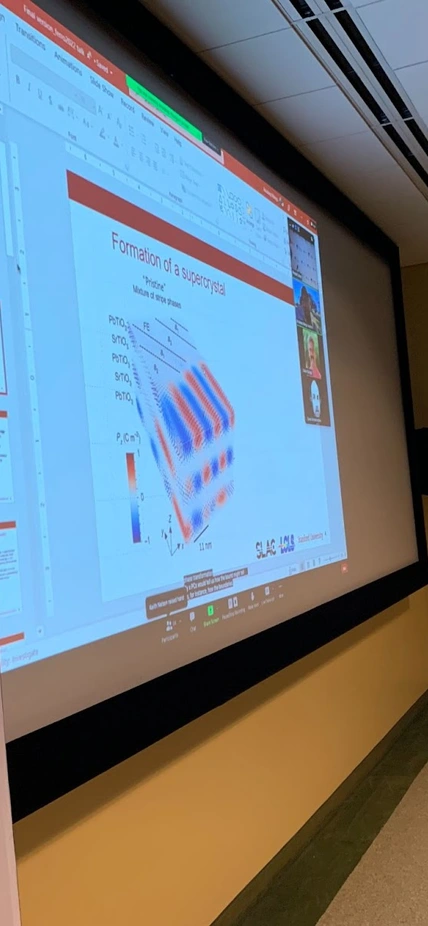From February 7-9, 2022, the Earth and Planets Laboratory (EPL) hosted the 33rd Annual Fundamental Physics of Ferroelectric and Related Materials workshop, also known as Ferro2022. For three days, 110 scientists attended the workshop in hybrid mode, bringing together an international group of scientists interested in active materials—especially materials that respond to electric fields.
What are ferroelectrics?
Ferroelectrics are materials that exhibit spontaneous polarization—the polarity of the material can then be reversed with an external electric field. These materials are essential to modern technology. They are what allow for medical ultrasound and SONAR. They are also used in fuel injection, electronic switches, solid-state memory, telescopes, materials diagnosis, and energy applications to scavenge waste energy.
These special materials also pose many fundamental questions about how they work and how they can be improved. Electric fields introduce theoretical problems for the quantum mechanics of materials, but there are also many questions that can be addressed by hands-on lab experimentation.
Because of this dichotomy, the workshop is generally about half experimental and half theoretical. This year was no exception—spanning newly discovered materials to the frontiers of ferroelectric theory.
Thirty years of field-defining workshops
EPL Staff Scientist Ronald Cohen, who is an expert on ferroelectrics, has organized the workshop every year since 1990. According to Cohen, it is the only workshop of its kind.
“Other workshops in this area are very applied or very much larger,” stated Cohen. “The intimate setting allows for free and focused discussion among attendees, which has led to several key advancements in the past.”
One such advancement was the Modern Theory of Polarization that was developed by participants sparked by these workshops in the 2000s, and which led to the rewriting of all solid-state physics textbooks.
The goals of the workshop have changed over time. In the earlier days of the workshop, the foundation of how to treat ferroelectrics with fundamental theory and experiments was developed. Now there is a big push towards new materials, and understanding unusual phenomena such as the piezoresponse of materials that should theoretically have none, the effects of defects, and the behavior of doped ferroelectrics and polar metals.
Supporting early-career scientists
In addition to the seminars and discussions, one of the highlights of the workshop are the student and postdoc presentation awards. The goal of these awards is to encourage young people who are just starting out to continue to pursue this type of research as a career.
“We try to encourage young people in the field and have been successful over the years, with many senior scientists having begun their careers at these workshops,” said Cohen.
This year the award winners were:
- Student Presentation Award, Joseph Casamento, Cornell University, Ferroelectricity in Polar ScAlN/GaN Epitaxial Semiconductor Heterostructures; Anudeep Mangu, Stanford University, Dynamics of an optically-induced phase transformation in ferroelectric superlattices probed by x-ray photon correlation spectroscopy
- Postdoc Presentation Award, Nikhil Sivadas, Oak Ridge National Laboratory, Anharmonic Stabilization of Ferrielectricity in Layered Thiophosphates: a First-Principles Case Study of CuInP2Se6
- Student Poster Award, Daniel Seleznev, Rutgers University, Investigation of polarization switching pathways in ferroelectric CuInP2S6
- Postdoc Poster Award, Wen-yi Tong, University de Liège, On the potential ferroelectric behavior of methylammonium lead iodide
Looking forward to next year
Hosting a workshop like this during COVID presents new challenges. But despite the hybrid environment, the workshop was a success.
Cohen said, “This year was a special challenge since we have never before run a hybrid meeting. Last year was totally virtual, which presented its own challenges, but hybrid is even harder.” He continued, “Nevertheless, it worked out very well, and we had a good mix of onsite and virtual talks and posters, with lots of discussions.
Next year’s event will be held at the Colorado School of Mines.
“Hopefully in person,” stated Cohen.
Learn more about the Ferroelecture series
